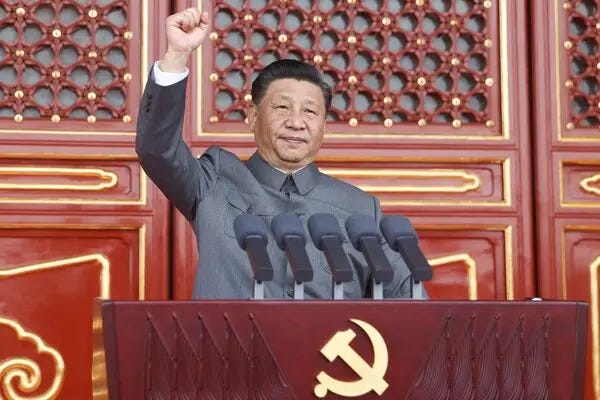Xi's Speech, & US Chip Export Controls
China pushes for stability, but the US ramps up the pressure
Hello and welcome to a quick What China Wants update.

Yesterday saw the National Party Congress open in Beijing. As Professor Zeng Jinghan forecast on our show last week, there was little in the way of policy lurch. Instead, there was a commitment to more of the same, which basically means political/economic expansion abroad and solid control at home. Regarding Hong Kong, the two systems approach (whatever that means now) is still the official way; for Taiwan, there was a reiteration of the need to reunify, and indeed force to achieve this is not off the table. Despite this “more of the same”, Xi did warn that the world faces dangerous times ahead.
A lack of announcements in his speech does not, however, mean that Xi and his comrades do not have plans for change in the pipeline. As Professor Zeng noted, most of the changes to course made by Xi were not announced at previous Congresses – for now, stability is the word.
For more analysis, this Thursday we welcome to the podcast Joseph Torigian, an assistant professor at the American University in Washington DC. He will discuss the latest from the Congress, and in particular where he thinks this will lead China in the short to medium term.
Congress aside, I have two other things for you to consider.
The first is something we have been talking about for a long time on What China Wants, which is the role that digital infrastructure (such as 5G networks, and broadband) play in China’s global influence efforts. Sir Jeremy Fleming, head of the UK intelligence agency GCHQ, came out last week warning how China uses its technology to increase its global influence. As a follow up to this, Sam has written a new article for CapX outlining how China’s digital ambitions challenge the UK’s security interests.
The second point is perhaps even more important to China’s relationship with the rest of the world. The Biden Administration recently announced tough new export controls on advanced chips to China, including those needed to train or run the most sophisticated artificial intelligence algorithms. It’s not only American firms who cannot deal with China anymore; leading chip makers in Taiwan and South Korea (like TSMC and Samsung) are also banned from dealing with China. US chip firms are already pulling out of China.
It might not have been widely reported by the mainstream news, but this is massive news. The problem is that Beijing has repeatedly said that it wants to be the dominant force in new technologies, such as AI, robotics, and autonomous vehicles; all these emerging technologies are likely to be impacted by the US export ban.
If China cannot make its own chips (which it cannot for now, hence the need for American ones) then this will put enormous strain on the Chinese tech economy. That will, in turn, put more pressure on the successful execution of the CCP’s economic plans, with all the risks this entails about regime legitimacy. The fact that more than half the world’s microchip production lies a hundred miles away in a “breakaway” province might become even more of an itch to scratch.
There is a historical precedent to all of this. In 1940, in response to Japanese aggression against French Indochina, the US placed an oil embargo on Japan. The Imperial Japnese Navy estimated that it had only two years of oil left, and so pressed for an invasion of the oil-rich Dutch East Indies (modern Indonesia). This directly led to the attack on Pearl Harbor and the intensification of the War. We aren’t quite there yet, but the more Beijing feels hemmed in, the more it feels America is preventing it fulfil what it thinks of as its destiny, the more risk there is of a new 1941.
It is not too dramatic to say we are sliding into dangerous times.
Remember you can also listen to the podcast on Apple, Amazon, or Spotify. We will be back on Thursday – see you then. Sam and Stewart.



